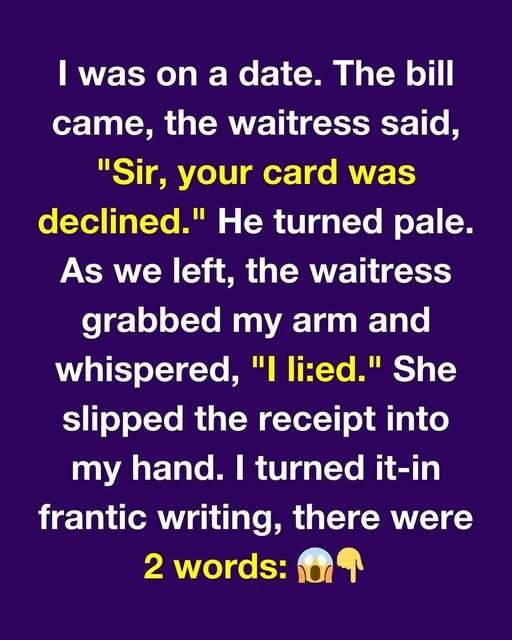As we left, the waitress brushed past me and grabbed my arm, leaning in just enough to whisper, “I lied.” Then she slipped the receipt into my hand.
Outside, Deacon was already a few steps ahead, scrolling through his phone as if nothing had happened.
“You okay?” he asked when he noticed me lagging.
I forced a smile. “Yeah… just need the bathroom.” I ducked back inside, heart pounding.
At the bar, the waitress caught my eye. Her expression was urgent.
“What is this?” I whispered, holding up the receipt.
On the back, scrawled in frantic handwriting, were two words: BE CAREFUL.
She leaned closer. “You don’t know him, do you?”
My stomach turned. “What do you mean?”
Her voice dropped to a whisper. “He comes in here all the time. Different women, always some excuse about money. One woman came back crying—said he stayed at her place, then stole her laptop and jewelry. He’s a scammer. I didn’t know how else to warn you.”
I thanked her, shaken, and walked back outside.
Deacon was waiting by his car, still talking, still smiling, oblivious to the warning note burning in my palm. He rambled on about his ex, about his “startup,” about how people never really “got him.” I nodded, watching the city lights blur past the window as he drove me home, my mind replaying every red flag I’d ignored.
When he pulled up to my house, he leaned in with that practiced grin. “Second date?”
I smiled faintly. “I’ll text you.”
He drove off, still grinning.
That night, I sat on my porch, heart racing. Part of me wanted to delete his number and pretend it never happened. But another part of me—the part that needed answers—opened my laptop.
I dug deeper. Social media, tagged photos, mutual friends. His real name wasn’t Deacon. It was Marvin.
Then I found it: a Reddit thread from women in my city warning each other about a guy who used fake names to scam dates. There were screenshots, stories, even a blurry photo. It was him.
Two days later, my phone buzzed.
“Hey, beautiful. Been thinking about you. Can I come over tonight?”
I should’ve blocked him. Instead, I typed: “Sure.”
But this time, I prepared. I hid my purse. My laptop was at my sister’s. I left nothing valuable in sight. One light on, cozy blanket on the couch, everything staged like normal.
He arrived with a cheap bottle of wine and that same smug grin. Ten minutes in, he mentioned his “car troubles,” how he might “need a place to crash for a few nights.” He said it like a joke, but I knew it wasn’t.
I played along until the moment felt right. Then I stood up.
“I know who you are, Marvin.”
His face went still. The charm drained away. For a long moment, we just stared at each other. Finally, he shrugged, muttered, “You got me,” and walked out. No fight, no excuses—just gone.
I thought that was the end of it. But two days later, I got a message from a stranger:
“Hey… did you go on a date with a guy named Deacon? I think he played me too.”
We met. Then another girl joined. Then another. In the end, there were at least nine of us in one city, all with the same story: dates, lies, missing money, stolen belongings.
We went to the police, but without hard proof, there wasn’t much they could do. So we did something else.
We started a private group chat. We shared names, photos, stories. We warned each other, and soon we began warning new women before it was too late.
That waitress’s warning didn’t just save me—it helped start something bigger.
Here’s what I learned: Sometimes a warning isn’t just for you. It’s a signal to protect others. That waitress didn’t owe me anything, but she trusted her instincts and acted. And now I do the same.
If you’ve ever had a gut feeling, trust it. If you’ve ever been lied to or played, remember—it’s not your fault. You are not alone. And sharing your story might be the very thing that saves someone else.

